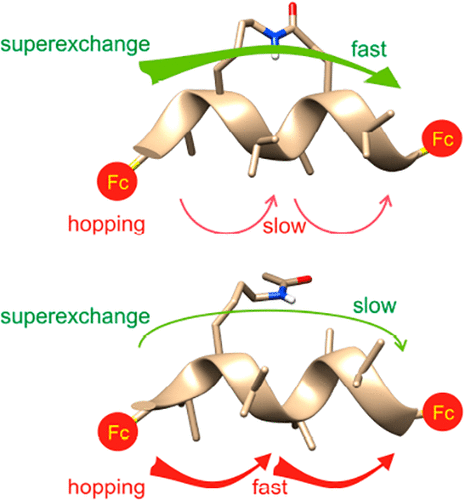当前位置:
X-MOL 学术
›
Acc. Chem. Res.
›
论文详情
Our official English website, www.x-mol.net, welcomes your feedback! (Note: you will need to create a separate account there.)
Peptides as Bio-Inspired Electronic Materials: An Electrochemical and First-Principles Perspective
Accounts of Chemical Research ( IF 18.3 ) Pub Date : 2018-09-07 00:00:00 , DOI: 10.1021/acs.accounts.8b00198 Jingxian Yu 1 , John R. Horsley 1 , Andrew D. Abell 1
Accounts of Chemical Research ( IF 18.3 ) Pub Date : 2018-09-07 00:00:00 , DOI: 10.1021/acs.accounts.8b00198 Jingxian Yu 1 , John R. Horsley 1 , Andrew D. Abell 1
Affiliation

|
Molecular electronics is at the forefront of interdisciplinary research, offering a significant extension of the capabilities of conventional silicon-based technology as well as providing a possible stand-alone alternative. Bio-inspired molecular electronics is a particularly intriguing paradigm, as charge transfer in proteins/peptides, for example, plays a critical role in the energy storage and conversion processes for all living organisms. However, the structure and conformation of even the simplest protein is extremely complex, and therefore, synthetic model peptides comprising well-defined geometry and predetermined functionality are ideal platforms to mimic nature for the elucidation of fundamental biological processes while also enhancing the design and development of single-peptide electronic components.
中文翻译:

作为生物灵感电子材料的肽:电化学和第一原理的观点
分子电子学处于跨学科研究的最前沿,它大大扩展了传统基于硅技术的功能,并提供了可能的独立替代方法。受生物启发的分子电子学是一个特别有趣的范例,例如,蛋白质/肽中的电荷转移在所有活生物体的能量存储和转化过程中都起着至关重要的作用。但是,即使是最简单的蛋白质,其结构和构象也极其复杂,因此,包含明确定义的几何结构和预定功能的合成模型肽是模拟自然的理想平台,以阐明基本的生物学过程,同时还增强了其的设计和开发能力。单肽电子元件。
更新日期:2018-09-07
中文翻译:

作为生物灵感电子材料的肽:电化学和第一原理的观点
分子电子学处于跨学科研究的最前沿,它大大扩展了传统基于硅技术的功能,并提供了可能的独立替代方法。受生物启发的分子电子学是一个特别有趣的范例,例如,蛋白质/肽中的电荷转移在所有活生物体的能量存储和转化过程中都起着至关重要的作用。但是,即使是最简单的蛋白质,其结构和构象也极其复杂,因此,包含明确定义的几何结构和预定功能的合成模型肽是模拟自然的理想平台,以阐明基本的生物学过程,同时还增强了其的设计和开发能力。单肽电子元件。


























 京公网安备 11010802027423号
京公网安备 11010802027423号